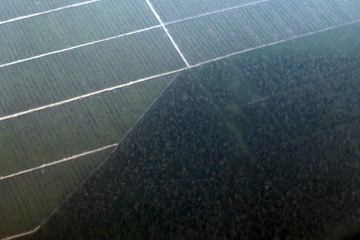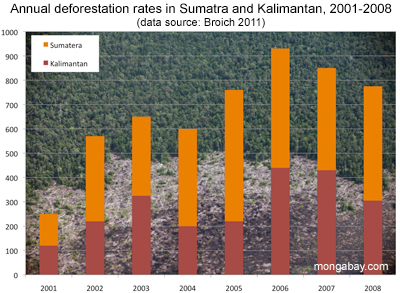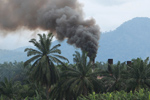Efforts to slow deforestation in Indonesia should include curtailing further expansion of forestry holdings by giant conglomerates, says an Indonesian activist group.
Analyzing data from the Ministry of Forest’s Production Forest Utilization Quarterly Report, Jakarta-based Greenomics-Indonesia found that seven conglomerates in Indonesia control more than 9 million hectares of land, including large forest concessions that will likely be exempt from any moratorium on forest clearing established under the country’s Reducing Emissions from Deforestation and Degradation (REDD) program. The extent of holdings could complicate Indonesia’s efforts to reduce emissions from logging and plantation development.
Two companies — Sinar Mas and Raja Garuda Mas — account for nearly 40 percent of the landbank. Both hold substantial areas of natural forest.
 Forest conversion in Central Kalimantan Data for Sinar Mas Group and Raja Garuda Mas holdings by number and location of their companies.
|
“The licenses for the establishment of industrial forestry plantations (Hutan Tanaman Industri/HTI) are dominated by just two business groups, Sinar Mas and Raja Garuda Mas, which between them and their 63 subsidiaries control 3.5 million hectares,” said Greenomics-Indonesia Executive Director Elfian Effendi.
Sinar Mas controls Asia Pulp & Paper and Golden Agri Resources, Indonesia’s largest palm oil company, among others. Raja Garuda Mas controls APRIL, a pulp and paper firm, and Asian Agri, a palm oil company.
Effendi added that five conglomerates — Kayu Lapis Indonesia (KLI), Alas Kusuma Grup, Barito Pacific Grup, Jati Grup and the Korindo Grup. — control more than 5.5 million hectares of logging concession licenses (Hak Pengusahaan Hutan/HPH). Like Sinar Mas and Raja Garuda Mas, these conglomerates control a web of subsidiaries — 37 in total.
Effendi is calling on the Indonesian government to halt these companies’ acquisition of new concessions. He says these groups’ current holdings violate a 1999 forest law (Forestry Act 41) that bans “oligopolistic practices” in the forestry licensing process.
“These regulations must be followed by a Minister of Forestry Regulation that prevents continued oligopolistic practices in the granting of licenses for the exploitation of such damaged secondary forest,” Effendi said, referring to a draft version of the presidential instruction imposing a forestry moratorium which allows the government to continue granting concessions in secondary forest areas. “The expansion of business shouldn’t be allowed to be used as an excuse for allowing the existing oligopolistic practices to continue.”
He told mongabay.com the 1999 law “prioritizes small and medium enterprises and cooperatives for business opportunities in the forestry sector.”
“By contrast, what has actually been happening is the continued growth of oligopolistic practices in forest exploitation,” he said.

|
Wood-pulp and oil palm plantations have emerged as major contributors to deforestation in Indonesia over the past two decades. By one estimate, nearly two million hectares of forest and peatland in Sumatra has been converted to pulp and paper plantations in recent years. Another study calculated that more than half of Indonesia’s palm oil expansion between 1990 and 2005 occurred at the expense of forest.
Logging, mining, fires, and agricultural expansion by smallholders and agribusiness also contribute significantly to forest loss in the country. Several studies have linked deforestation to corruption at local, provincial, and national levels.
Indonesia is thought to have past Brazil as the world’s largest deforester in recent years.
Related articles
Losses from deforestation top $36 billion in Indonesian Borneo
(04/29/2011) Illegal forest conversion by mining and plantation companies in Indonesian Borneo has cost the state $36 billion according to a Forest Ministry official.
Indonesian official: REDD+ forest conservation plan need not limit growth of palm oil industry
(04/29/2011) Indonesia’s low carbon development strategy will not impede the palm oil industry’s growth said a key Indonesian climate official during a meeting with leaders from the country’s palm oil industry. During a meeting on Thursday, Kuntoro Mangkusubroto, head of Indonesian President Susilo Bambang Yudhoyono’s REDD+ Task Force, asked industry leaders for their input on the government’s effort to shift oil palm expansion to degraded non-forest land.
New World Growth report contains ‘false and misleading’ information
(03/31/2011) A new report from World Growth International, a lobby group for industrial forestry interests, contains ‘false and misleading’ information on the economic impact of reducing Indonesia’s deforestation rate, says an Indonesian environmental group. The report, released today, claims that reducing deforestation in Indonesia will cost the country 3.5 million jobs annually by slowing expansion in the forestry sector.
Pro-deforestation group criticizes palm oil giant for sustainability pact
(03/24/2011) World Growth International, a group that advocates on behalf of industrial forestry interests, has criticized Golden Agri Resources (GAR), Indonesia’s largest palm oil producer, for signing a forest policy that aims to protect high conservation value and high carbon stock forest and requires free, prior informed consent (FPIC) in working with communities potentially affected by oil palm development. In a newsletter published March 10, World Growth International claimed that GAR’s agreement “could severely hamper the company’s growth” by limiting where it can establish new plantations and says that negotiating with multiple stakeholders “will delay and complicate any investment by the company.” World Growth International concludes by implying that GAR may renege on its commitment. But Peter Heng, Managing Director, Communications and Sustainability at GAR, disagreed with World Growth International’s assessment.
Illegal mining, plantation development rampant in Indonesian Borneo; state losses top $17B
(02/01/2011) Hundreds of mining and oil palm plantation companies are operating illegally in Indonesian Borneo, according to a investigation by an task force set up by President Susilo Bambang Yudhoyono.
Indonesia grants slew of last-minute logging concessions on eve of moratorium
(01/25/2011) Indonesia’s Minister of Forestry granted nearly 3 million hectares of plantation forestry concessions the day before the country’s president was due to sign a decree establishing a two-year moratorium on new logging licenses, reports a new analysis by Greenomics, an Indonesian environmental group.
Does chopping down rainforests for pulp and paper help alleviate poverty in Indonesia?

(01/13/2011) Over the past several years, Asia Pulp & Paper has engaged in a marketing campaign to represent its operations in Sumatra as socially and environmentally sustainable. APP and its agents maintain that industrial pulp and paper production — as practiced in Sumatra — does not result in deforestation, is carbon neutral, helps protect wildlife, and alleviates poverty. While a series of analyses and reports have shown most of these assertions to be false, the final claim has largely not been contested. But is conversion of lowland rainforests for pulp and paper really in Indonesia’s best economic interest?
Will Indonesia’s big REDD rainforest deal work?

(12/28/2010) Flying in a plane over the Indonesian half of the island of New Guinea, rainforest stretches like a sea of green, broken only by rugged mountain ranges and winding rivers. The broccoli-like canopy shows little sign of human influence. But as you near Jayapura, the provincial capital of Papua, the tree cover becomes patchier—a sign of logging—and red scars from mining appear before giving way to the monotonous dark green of oil palm plantations and finally grasslands and urban areas. The scene is not unique to Indonesian New Guinea; it has been repeated across the world’s largest archipelago for decades, partly a consequence of agricultural expansion by small farmers, but increasingly a product of extractive industries, especially the logging, plantation, and mining sectors. Papua, in fact, is Indonesia’s last frontier and therefore represents two diverging options for the country’s development path: continued deforestation and degradation of forests under a business-as-usual approach or a shift toward a fundamentally different and unproven model based on greater transparency and careful stewardship of its forest resources.